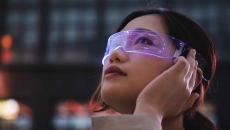mixed reality
The offering projects real-time 3D visuals of screw placement into a surgeon's field of view to improve accuracy in spine surgery.
Immersive technologies offer powerful new tools for mental healthcare, but their implementation must be grounded in clinical principles and executed with competence.
Augmented reality and virtual technologies are shaping innovative approaches in operating rooms, mental health care and patient monitoring.
The company received expanded 510(k) clearance following software enhancements of its cranial-navigation system for neurosurgery.
Dr Yujia Gao, assistant group chief technology officer at the National University Health System, relays how mixed reality is transforming the health systems' operations, including provider workflow and surgical planning for transplants.
The company will develop experiences that train individuals in the biopharmaceutical and life sciences sectors.
Students and teachers can effortlessly switch between VR and the real world with just one click in laboratory lessons, learning from the virtual human body and real cadavers simultaneously.
The augmented reality headset is priced at $3,500, while the Azure Kinect developer kits will run $399.



